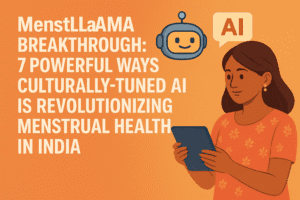MenstLLaMA Breakthrough: 7 Powerful Ways Culturally-Tuned AI Is Revolutionizing Menstrual Health in India
Addressing India’s critical gap in accessible menstrual health education, researchers developed MenstLLaMA, a specialized AI model tailored for cultural sensitivity and accuracy. Unlike general AI tools (like GPT-4o or Claude-3) that often provide generic, complex, or culturally inappropriate answers, MenstLLaMA was trained on 23,820 meticulously annotated, India-specific question-answer pairs reflecting diverse regions, ages, and social contexts.
Rigorous evaluation proved its superiority: it outperformed leading AI models on technical metrics, was preferred by medical experts over gold-standard answers in sensitive scenarios, and scored exceptionally high (4.1-4.7/5) with real users for understandability, relevance, correctness, and empathetic tone.
This demonstrates how AI, when deliberately designed with local context and human needs at its core, can become a powerful, scalable tool to deliver trustworthy, stigma-free health education, empowering users with knowledge tailored to their realities. Its approach offers a vital blueprint for using technology to advance global health equity.

The persistent challenges surrounding menstrual health education (MHE) in India – driven by poverty, deep-seated stigma, and gender inequality – are well-documented. While grassroots efforts make strides, reaching millions with accurate, empathetic, and culturally relevant information remains a massive hurdle. A groundbreaking study now demonstrates how Artificial Intelligence (AI), specifically deliberately designed AI, offers a powerful, scalable solution. Introducing MenstLLaMA, a specialized Large Language Model (LLM) built not just for accuracy, but for understanding the unique social and cultural fabric of India.
The Problem with General AI: Missing the Mark on Menstruation
Existing powerhouse LLMs like GPT-4o or Claude-3, while impressive, often stumble in this critical domain. Their limitations in the Indian MHE context are stark:
- Low Accuracy: Providing generic or medically oversimplified information.
- Cultural Insensitivity: Overlooking local customs, taboos, and language nuances, potentially causing offense or alienation.
- Inaccessible Complexity: Using language and concepts too advanced for diverse audiences, including adolescents and those with varying literacy levels. General AI, it turns out, isn’t naturally equipped for the empathy and context required for effective menstrual health education.
MenstLLaMA: Purpose-Built for India’s Needs
Researchers addressed this gap head-on by developing MenstLLaMA. This wasn’t just a minor tweak; it was a fundamental reshaping:
- The MENST Dataset: The cornerstone is a novel, meticulously curated dataset of 23,820 real-world question-answer pairs. Sourced from Indian medical websites, government portals, and educational resources, it was systematically annotated with vital context: age groups, regions, specific topics, and crucially, sociocultural factors. This dataset reflects the actual concerns and language of the target audience.
- Intelligent Fine-Tuning: Starting with Meta’s capable LLaMA-3-8B-Instruct model, researchers used parameter-efficient fine-tuning (specifically Low-Rank Adaptation – LoRA). This allowed MenstLLaMA to deeply absorb the domain-specific knowledge and cultural context of the MENST dataset without the massive computational cost of retraining a model from scratch. The goal was explicit: align the AI with Indian MHE needs.
- The ISHA Interface: MenstLLaMA powers “ISHA” (Intelligent System for Menstrual Health Assistance), providing a user-friendly chat interface for interaction.
Rigorous Testing: Does It Actually Work?
The evaluation of MenstLLaMA was exceptionally thorough, moving far beyond simple automated checks:
- Benchmarking the Giants: MenstLLaMA outperformed 9 leading general LLMs (including GPT-4o, Claude-3, Gemini 1.5 Pro) on key NLP metrics like BLEU and BERTScore, proving its technical superiority in generating relevant and accurate text for this specific domain.
- Clinical Expert Scrutiny: 18 medical professionals rigorously evaluated 200 expert-curated queries. MenstLLaMA didn’t just match accuracy; in culturally sensitive scenarios, its responses were preferred over the pre-defined “gold standard” answers. This highlights its unique ability to navigate complex social nuances appropriately.
- Medical Practitioner Feedback (via ISHA): Doctors using ISHA rated MenstLLaMA highly for relevance (3.5/5), understandability (3.6/5), correctness (3.5/5), and especially context sensitivity (4.0/5) – confirming its practical utility in a clinical or educational setting.
- Real User Experience (N=200): This was the most telling test. Volunteers engaged in 15-20 minute sessions rated MenstLLaMA remarkably high across critical user satisfaction metrics:
- Understandability: 4.7/5 (Crucial for reaching diverse audiences)
- Relevance: 4.3/5
- Preciseness: 4.28/5
- Correctness: 4.1/5
- Tone: 4.6/5 (Indicating empathy and supportiveness)
- Flow: 4.2/5
- Context Sensitivity: 3.9/5
Why This Matters: More Than Just a Tech Demo
MenstLLaMA isn’t just a better chatbot. It represents a paradigm shift:
- Bridging the Empathy Gap in AI: It demonstrates that AI can be engineered for cultural sensitivity and appropriate emotional tone in sensitive health domains.
- Scalability Meets Quality: It offers a path to disseminate high-quality, vetted MHE information at an unprecedented scale across India’s vast and diverse population, overcoming geographical and resource barriers.
- Empowerment Through Accessibility: By prioritizing understandability and context, it empowers users – particularly adolescents and those in underserved communities – with knowledge in a way they can genuinely relate to and use.
- A Blueprint for Global Health Equity: The methodology – curated local datasets + efficient cultural fine-tuning – provides a powerful template for developing specialized AI assistants for other health challenges and cultural contexts worldwide.
The Path Forward: Voice, Vision, and Wider Reach
The research points to exciting future directions: exploring long-term impacts on perceptions and hygiene practices, expanding demographic representation in training and testing, enhancing context sensitivity even further, and crucially, integrating multimodal (images/video) and voice-based interactions. Voice interfaces could be transformative for accessibility, reaching users with low literacy or those who prefer oral communication.
The Human Insight: Technology Serving Humanity
MenstLLaMA‘s success underscores a vital principle: Technology alone isn’t the solution. The solution lies in thoughtfully applying technology to deeply understand and serve human needs within their specific cultural realities. By grounding AI development in local context, expert knowledge, and real user feedback, MenstLLaMA moves beyond being just an LLM. It becomes a potential catalyst for breaking down stigma, promoting health equity, and empowering millions with the knowledge they need and deserve about their own bodies. This is AI not as a replacement for human connection, but as a powerful, scalable tool to enable it.
You must be logged in to post a comment.